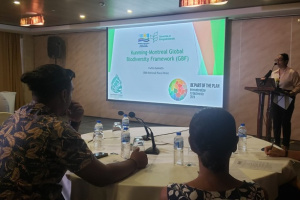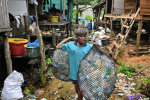AU's commission on human and people's rights commends Seychelles efforts while urging for inconsistencies to be addressed

Yeung Kam John Yeung Sik Yuen, the commissioner in charge of monitoring the promotion and the protection of human rights in Seychelles speaking at the Press Conference on Friday. (Joena Bonnelame, Seychelles News Agency)
(Seychelles News Agency) - An African Commission of Human and People's Rights (ACHPR) delegation has recognised what it termed as “laudable efforts” made by the Seychelles government and other stakeholders towards the realisation of citizens’ rights while at the same time highlighting challenges that limit the enjoyment of certain human rights guaranteed under the African Charter.
This summation came out at the end of a five-day visit by the commission’s four-strong delegation to the Indian Ocean archipelago with a population of around 90,000 people.
Led by Yeung Kam John Yeung Sik Yuen, the commissioner in charge of monitoring the promotion and the protection of human rights in Seychelles, also the Chairperson of the Commission’s Working Group on the Rights of Older Persons and Persons with Disabilities in Africa, the delegation held a total of 28 meetings.
The aim was to assess the human rights situation in the country, identify best practices as well as factors restricting citizens from effectively enjoying their rights.
These included a meeting with the archipelago’s President James Michel, government officials, members of the judiciary, representatives of civil society and political parties, the Ombudsman and Chairperson of the National Human Rights Commission, representatives of the media and parliamentarians among others. They also visited the main prison at Montagne Posée in the mountains in the south of the main inhabited island, Mahé.
Their preliminary report presented during a press conference held at the Seychelles Ministry of Foreign Affairs on Friday acknowledged efforts and strategies put in place in Seychelles for the realisation of human rights.
According to the interim report, these include the establishment of Human Rights bodies, the low percentage of joblessness, efforts to align prison conditions with international standards and the noticeable representation of women in decision-making bodies.
The provision of free health care, the reduction of child and maternal morbidity, as well as the "outstanding management” of the HIV/AIDS pandemic, were among other points mentioned.
However, Sik Yuen, who is also a former Chief Justice of the neighbouring Indian Ocean island of Mauritius, noted that the delegation had come across certain challenges "which inhibit the full realisation and enjoyment of human rights in Seychelles.”
He said these include the system of automatic promotion in the education sector, the alleged lack of transparency in the allocation of social housing, reports of discrimination based on political affiliation or opinion - all issues which would negatively impact access to public services and other economic and social rights.
The issue of mandatory sentencing imposed on the courts, the shortage of local professionals in key sectors like the judiciary and police and the lack of specific legal provisions criminalising torture are some of the other shortcomings highlighted by the report.
The report has made a number of recommendations to the Seychelles government.
“Specifically there is a need to reconcile the compulsory ten years mandatory schooling and the legal age of employability; repeal the mandatory sentencing in order to avoid any apparent or real hindrance to the sacrosanct principle of the separation of powers in a democratic system; criminalise expressly torture in its national laws and establish a National Preventive Mechanism in compliance with international standards, etc,” said Sik Yuen.
The island nation’s government has also been called upon “to expedite its ratification of regional and international instruments that have not yet been ratified.”
According to a press statement issued by the Ministry of Foreign Affairs and Transport this morning, the full findings of the mission’s visit to Seychelles will be presented at an upcoming session of the African Commission of Human and People's Rights.
The African Commission of Human and People's Rights was set up in 1987 within the framework of the Organisation of African Unity (OAU, now the African Union (AU) and sits in Banjul, capital of the West African Republic of Gambia.
Its 11 commissioners, mostly former judges, economists and leaders of civil society are African personalities described to be "of the highest reputation, known for their high morality and integrity."





